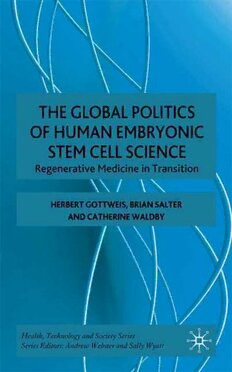
Global Politics of Human Embryonic Stem Cell Science PDF
236 Pages·2009·0.831 MB·English
Most books are stored in the elastic cloud where traffic is expensive. For this reason, we have a limit on daily download.
Preview Global Politics of Human Embryonic Stem Cell Science
Description:
Regenerative medicine is a field characterized by a global struggle for scientific, economic and national advantage. Drawing on a wide range of interviews, primary and secondary sources, this book investigates the dynamic interactions between national regulatory formation and the global biopolitics of regenerative medicine and human embryonic stem cell science. Today governments are under intense competitive pressure to fund and develop attractive national environments for embryonic stem cell science, which promises both to improve the health and productivity of aging populations and to develop therapies for global health markets. This study traces the development of internationally circulating arguments for and against stem cell research, and the various transnational bioethical spaces that have opened up to try and steer these arguments towards compromise and implementation. It considers the flow of embryonic and reproductive biological materials from south to north, and the ways these flows play into broader relations around global biopolitics. It investigates the place of transnational regulatory bodies like the EU and the UN in organizing and modifying the international and national debates around stem cell science, and ways in which national debates and policies influence each other. It makes a major contribution to our understanding of the dynamics of power that fuels the emergence of global regenerative medicine in the age of biotechnology.
See more
The list of books you might like
Most books are stored in the elastic cloud where traffic is expensive. For this reason, we have a limit on daily download.
